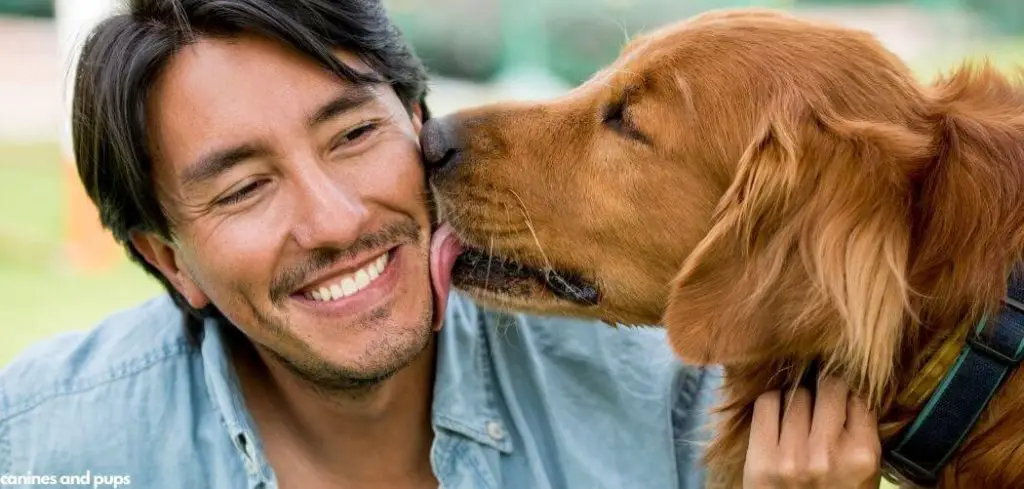When a dog is excessively licking your face, it can feel sweet at first, but when it becomes obsessive, it can be concerning.
Dogs lick to communicate, show affection, and sometimes to indicate discomfort or stress. If it happens excessively, it may point to behavioral issues, underlying medical problems.
We outline the common reasons why your dog may excessively lick your face, what you can do, and when to seek veterinary help.
Table of Contents
Dog Excessively Licking My Face — Why It Happens
Your dog may lick your face to show affection, bond with their human, or seek attention. However, when the behavior becomes persistent, it may indicate issues like anxiety, nausea, dental discomfort, or even compulsive disorders.
While licking is a natural dog behavior, excessive licking of your face should not be ignored, as it could be a signal that something is wrong.

Dog Excessively Licking My Face: Common Causes
Affection and Attention-Seeking
Dogs naturally lick their owners as a way of bonding. Face licking can be their version of a kiss, showing submission or affection.
However, some dogs may do it excessively if they realize it gets them attention. This can turn into a habit that feels compulsive, especially if owners react strongly each time.
Read more: Dog Excessively Licking My Feet (Causes you should know)
Anxiety or Stress
Anxiety can manifest in dogs through repetitive behaviors such as excessive licking.
If your dog is stressed by separation, new environments, or loud noises, licking your face may be their way of seeking comfort. The constant need to lick may soothe them, similar to how humans might fidget when nervous.
Nausea or Digestive Upset
When dogs feel nauseous or have digestive discomfort, they may lick more frequently. This can include licking objects, themselves, or even your face.
The act of licking may help them cope with the sensation of nausea or stomach upset, making it important to monitor if the behavior coincides with other digestive symptoms like drooling, vomiting, or not eating.
Dental or Mouth Problems
Oral health issues such as gum disease, tooth pain, or infections can cause dogs to lick excessively. They may lick your face because it is a convenient outlet for their discomfort.
Bad breath, drooling, or difficulty eating can accompany this type of licking, making it a red flag for dental evaluation.
Compulsive Behavior Disorder
Some dogs develop compulsive disorders where licking becomes a repetitive, uncontrollable action.
Just as humans can develop habits like nail biting, dogs may resort to constant licking, even of their owner’s face.
Compulsive licking is usually persistent and doesn’t stop even when attention or comfort is provided, signaling the need for professional behavioral support.
Learned Behavior and Reinforcement
Dogs are quick learners, and if licking your face results in laughter, pets, or attention, they will repeat the action.
Over time, this can escalate into excessive licking simply because it has been reinforced positively. While not inherently harmful, it can become overwhelming and challenging to break without training.
What to Do If Your Dog Is Excessively Licking Your Face
If your dog is constantly licking your face, start by gently redirecting the behavior. Offer them a toy, chew, or treat to shift their focus. Training commands such as “sit” or “stay” can help redirect their energy in a positive way.
Make sure your dog is getting enough physical and mental stimulation throughout the day. Walks, playtime, and puzzle toys can reduce boredom and anxiety-driven behaviors. Dogs with less pent-up energy are less likely to develop repetitive licking habits.
Keep an eye on their oral health and overall wellness. Regular dental checkups and professional cleanings can help prevent mouth-related causes of licking. Additionally, ensure your dog’s diet is balanced and not contributing to nausea or discomfort.
If stress or separation anxiety is the cause, calming aids such as anxiety vests, safe chew items, or structured routines can help them feel more secure. For severe cases, working with a trainer or behaviorist may be the best solution.
When to Call or Visit Your Vet
While occasional licking is normal, you should contact your veterinarian if the behavior becomes obsessive and does not improve with redirection. Veterinary attention is especially important if the licking is accompanied by drooling, vomiting, lack of appetite, or signs of oral pain.
If your dog seems restless, anxious, or unable to stop licking even when distracted, this may indicate an underlying medical or behavioral issue that requires professional evaluation. Dental pain, gastrointestinal problems, or compulsive disorders should not be left untreated.
Seek immediate veterinary advice if excessive licking is paired with sudden changes in appetite, excessive salivation, pawing at the mouth, or signs of distress. These symptoms may point to an urgent health condition that needs prompt care.
Read more: Dog licking me excessively suddenly (What it really means)
Key Takeaway
Excessive face licking in dogs can be more than just a quirky behavior. While it may begin as a sign of affection, it can also point to stress, nausea, dental problems, or even compulsive disorders.
Paying attention to the context and frequency of the licking is key to knowing whether it is harmless or a sign of something deeper.
If the behavior persists or is paired with other concerning symptoms, consulting a veterinarian is the best step.
With patience, training, and care, most cases of excessive licking can be managed effectively while keeping your dog healthy and happy.
